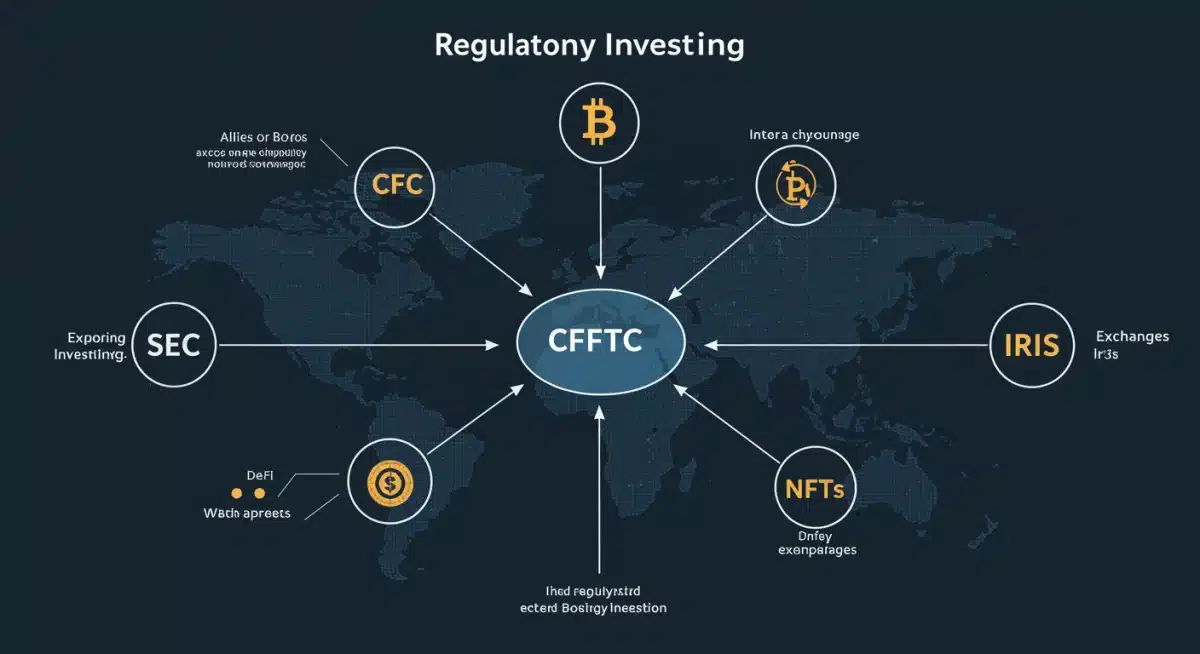New Crypto Regulations 2025: US Investor Essentials

The landscape of digital asset investment in the United States is on the brink of significant transformation. As 2025 approaches, investors must prepare for the impact of New Regulations in Crypto Investing: What US Investors Need to Know for 2025 (RECENT UPDATES), which promise to reshape how cryptocurrencies are traded, held, and taxed.
Understanding the Regulatory Shift
The US regulatory environment for cryptocurrencies has historically been fragmented, with various agencies asserting jurisdiction over different aspects of digital assets. However, recent developments indicate a concerted effort to establish a more unified and comprehensive framework. This shift is driven by a desire to protect investors, mitigate financial risks, and bring clarity to a rapidly evolving industry.
As of late 2024, several key federal bodies are actively working on or have proposed rules that will come into full effect by 2025. These include the Securities and Exchange Commission (SEC), the Commodity Futures Trading Commission (CFTC), and the Internal Revenue Service (IRS). Their coordinated actions are expected to create a more defined operational space for crypto businesses and a safer environment for investors.
SEC’s Expanding Oversight
The Securities and Exchange Commission continues to assert its authority over digital assets it deems to be securities. This includes most initial coin offerings (ICOs) and many altcoins. The SEC’s primary goal is investor protection, ensuring that those offering crypto assets provide adequate disclosures and adhere to securities laws.
- Classification Clarity: Expect clearer guidelines on what constitutes a security versus a commodity in the crypto space, reducing ambiguity.
- Exchange Registration: More crypto exchanges and platforms facilitating the trading of securities tokens will likely face stringent registration requirements.
- Enforcement Actions: The SEC is anticipated to continue its aggressive enforcement against unregistered offerings and fraudulent activities.
CFTC’s Role in Derivative Markets
The Commodity Futures Trading Commission (CFTC) primarily regulates the derivatives markets, which include futures and options on commodities. Given that Bitcoin and Ethereum are largely considered commodities by the CFTC, their oversight extends to derivative products based on these and other digital assets.
For 2025, the CFTC is focusing on ensuring market integrity and preventing manipulation in the burgeoning crypto derivatives space. This involves close collaboration with exchanges and clearinghouses to establish robust risk management practices and surveillance capabilities. Their efforts aim to create a more stable and transparent market for institutional and retail investors alike.
New Rules for Derivatives Platforms
Platforms offering crypto derivatives to US investors will face enhanced scrutiny. The CFTC is particularly concerned with ensuring these platforms meet capital requirements, implement effective cybersecurity measures, and provide fair access to all participants. This move seeks to professionalize the market and reduce systemic risks.
Expect to see:
- Increased Reporting: More detailed reporting requirements for trading activity and customer holdings.
- Operational Resilience: Stricter standards for technological infrastructure and disaster recovery plans.
- Customer Segregation: Clear rules on how customer funds must be segregated from operational capital to protect against insolvencies.
IRS Guidance on Crypto Taxation
Taxation of cryptocurrencies remains a complex area for many US investors. The IRS has been steadily issuing guidance, and 2025 will see further clarification and potentially more aggressive enforcement of existing tax laws related to digital assets. Investors need to be acutely aware of their tax obligations, especially concerning capital gains, income from staking, and DeFi activities.
The IRS views cryptocurrency as property for tax purposes, meaning every transaction—from trading one crypto for another to spending crypto on goods—can be a taxable event. The new regulations aim to close loopholes and ensure comprehensive reporting of crypto-related income and gains.
Enhanced Reporting Requirements
New regulations are expected to mandate that crypto exchanges and brokers provide more comprehensive tax forms to users, similar to traditional financial institutions. This will significantly simplify reporting for investors but also increase the IRS’s visibility into crypto transactions.
Investors should prepare for:
- Form 1099-B Equivalents: Brokerages will likely be required to issue forms detailing sales proceeds and cost basis for crypto transactions.
- Staking and Lending Income: Clearer guidance on how income derived from staking, lending, and other DeFi protocols should be reported.
- Foreign Account Reporting: Potential updates to requirements for reporting crypto held in foreign accounts (e.g., FBAR).
State-Level Regulations and Licensing
Beyond federal oversight, individual states continue to play a significant role in regulating crypto businesses operating within their borders. Many states have specific licensing requirements for money transmitters, which often apply to cryptocurrency exchanges and custodians. This patchwork of state laws can create additional compliance burdens for businesses and impact the availability of certain services for investors.
By 2025, some states may move towards more harmonized approaches, or conversely, introduce even more stringent local regulations. Investors should be aware of the specific rules in their state of residence, especially regarding access to certain platforms or types of digital assets.

Impact on Access and Services
The varying state regulations can dictate which crypto services are available to residents. For instance, some states have strict ‘BitLicense’ requirements that can deter smaller platforms from operating there, potentially limiting investor choice. This decentralization of regulation adds another layer of complexity for US crypto investors.
Key considerations:
- Geographic Restrictions: Certain crypto platforms or features may not be available in all states due to licensing issues.
- Consumer Protection Laws: State-specific laws may offer additional protections or impose different requirements on crypto service providers.
- Innovation vs. Regulation: The balance between fostering innovation and ensuring consumer safety continues to be a challenge at the state level.
Consumer Protection and Fraud Prevention
A central theme across all new regulations for 2025 is enhanced consumer protection. Regulatory bodies are increasingly concerned about the prevalence of fraud, scams, and market manipulation within the crypto space. New rules aim to provide investors with greater transparency, better disclosures, and clearer recourse mechanisms in case of misconduct.
This includes efforts to combat illicit finance, such as money laundering and terrorist financing, by requiring crypto firms to implement robust Anti-Money Laundering (AML) and Know Your Customer (KYC) procedures. For investors, this means more stringent identity verification processes but also a safer overall ecosystem.
Strengthening Market Integrity
Regulators are pushing for measures that will make crypto markets more resilient and less susceptible to abuse. This involves encouraging whistleblowers, increasing surveillance capabilities, and imposing heavier penalties for those who engage in fraudulent activities. The goal is to build trust in the digital asset space for broader adoption.
Expect:
- Clearer Disclosures: Platforms will need to provide more explicit information about the risks associated with crypto investing.
- Improved Security: Requirements for enhanced cybersecurity measures to protect customer assets from hacks and theft.
- Dispute Resolution: Better mechanisms for investors to resolve disputes with crypto service providers.
Navigating DeFi and NFTs
Decentralized Finance (DeFi) and Non-Fungible Tokens (NFTs) present unique challenges for regulators due to their inherently decentralized and often pseudonymous nature. As these sectors continue to grow, 2025 will likely see initial attempts by regulators to bring some level of oversight without stifling innovation. The approach may differ significantly from that applied to centralized exchanges.
The SEC and CFTC are exploring how existing securities and commodities laws can be applied to DeFi protocols and NFT projects. The focus will likely be on the participants who exert control or profit from these ecosystems, rather than strictly on the underlying technology itself. This nuanced approach aims to prevent systemic risks while allowing for continued technological development.
Future of Decentralized Regulation
Regulating DeFi and NFTs is a complex task, given their borderless and permissionless characteristics. However, the intent is clear: to ensure that even in decentralized environments, basic principles of market integrity and investor protection are upheld. This could lead to a focus on the ‘front-ends’ or centralized interfaces that allow access to DeFi protocols, or on specific actors within the ecosystem.
Potential areas of focus include:
- Protocol Developers: Consideration of whether developers or founders of DeFi protocols bear regulatory responsibilities.
- NFT Marketplaces: Increased scrutiny on marketplaces for ensuring authenticity, preventing fraud, and adhering to AML/KYC.
- Stablecoin Regulations: Dedicated regulatory frameworks for stablecoins, which are often integral to DeFi, are highly anticipated.
| Key Regulatory Area | Brief Description of 2025 Impact |
|---|---|
| SEC Oversight | Clearer classification of crypto assets as securities and stricter registration for exchanges. |
| CFTC Derivatives | Enhanced market integrity and risk management for crypto futures and options. |
| IRS Taxation | More comprehensive tax reporting from brokers and clearer guidance on various crypto income types. |
| Consumer Protection | Increased transparency, fraud prevention, and recourse mechanisms for investors. |
Frequently Asked Questions About US Crypto Regulations 2025
SEC regulations primarily target exchanges and new offerings. If your holdings are deemed securities, exchanges might implement stricter trading rules or delist them. It’s crucial to stay informed about SEC classifications to understand potential impacts on liquidity and accessibility for your specific assets.
The IRS is expected to mandate more detailed reporting from crypto brokers, similar to traditional financial institutions. This means you’ll likely receive comprehensive tax forms (e.g., 1099-B equivalents) summarizing your disposals and cost basis, simplifying your tax preparation but increasing IRS visibility.
While direct regulation of every decentralized protocol is challenging, regulators are actively exploring ways to apply existing laws to DeFi and NFTs. Focus may be on centralized interfaces, liquidity providers, or specific actors within these ecosystems to ensure investor protection and financial stability without stifling innovation.
US-based crypto exchanges will face increased compliance burdens, including stricter registration, capital requirements, and enhanced AML/KYC procedures. This aims to foster a more secure and transparent trading environment, potentially leading to fewer, but more robust, regulated platforms operating within the US.
Investors should diligently track official guidance from the SEC, CFTC, and IRS. Maintain meticulous records of all crypto transactions for tax purposes. Consider consulting with a financial advisor specializing in digital assets to understand personal implications and ensure compliance with evolving legal frameworks.
What This Means
The upcoming regulatory changes for 2025 signal a maturation of the US crypto market. While potentially introducing stricter compliance for businesses and more reporting for investors, these developments are ultimately aimed at building a more stable, transparent, and secure environment for digital assets. This shift could pave the way for greater institutional adoption and mainstream acceptance of cryptocurrencies, reducing the prevalence of illicit activities and enhancing investor confidence. The ongoing dialogue between policymakers and industry stakeholders will be critical in shaping the final contours of these regulations.